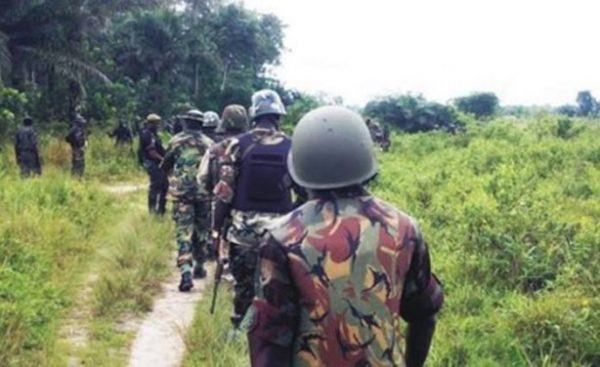For some years there has been friction between the Nigerian military and INGOs due to military anger at what it sees as interference in its methods
Background
Military Operations.
The conflict in North Eastern Nigeria has continued for the past ten years. Despite repeated reassurances by both the President and military commanders that Boko Haram has been defeated, fighting goes on. The stalemate is attributed to corruption and black-market profiteering by many stakeholders.
In response to a series of tactical reversals, the Nigerian military has made changes to its strategy. They are currently consolidating their forces into both existing and soon to be created ‘super camps’. The military logic is that super camps will provide the required force levels to properly defend the sites from enemy assault, whilst also sustaining a mobile and potent attack force which can rest and re-equip safely between conduct of focused, intelligence led strikes against the enemy. In the meantime, there is an operational vacuum across much of Borno which is being heavily exploited, in the north predominantly by the Islamic State of West Africa Province faction (ISWAP) and in the south by Boko Haram (BH).
Military & INGO Relationship
For some years there has been friction between the Nigerian military and INGOs due to military anger at what it sees as interference in its methods. . In December 2018 the Army stated that Amnesty International was 'determined to destabilise' the nation via the 'fictitious allegations of alleged human rights abuses' and called for both Amnesty International and UNICEF to be thrown out of the country.
INGOs can only offer neutral, impartial, and independent humanitarian aid to the most vulnerable by being able to operate in an atmosphere of stakeholder acceptance. However, these parameters only serve to enhance the suspicions of the Nigerian military that INGOs are being too liberal and even criminal in their impartiality.
This simmering tension has again erupted into direct action. Two aid agencies have had offices closed (Action Against Hunger & Mercy Corps) by the military in the past few weeks and there are fears in the charity sector that Nigeria is targeting as many as 10 independent humanitarian organisations for possible closure.
Impact on Internally Displaced Persons
There is already an identified lack of financing - the UN has declared that it has failed to achieve totals requested from donors in 2018 to deal with the impending food crisis. There is also both stakeholder fatigue and irritation. This has manifested itself not only in the military’s recent actions against INGOs but also in recent IDP protests in several north eastern locations and in continuing poor management of resource distribution. The lack of application of the national strategic recovery plan also frustrates many. *
Given the inconsistency and frictions, there is risk that IDP returnees to communities will again lose faith in the Government’s stabilisation efforts and move themselves back to places of perceived safety – Cameroon, Maiduguri or Damaturu, negating the efforts of the past eighteen months and only exacerbating the humanitarian crisis in the north east.
Assessment
Recent adjustments, such as ‘Operation Positive Identification’, for which citizens are compulsorily required to carry identification are signs of a changing security climate in NE Nigeria.
Other government agencies, such as the Department of State Security (DSS), The Economic Financial Crimes Commission (EFCC) and certain politicians, are already looking to increase regulatory oversight on NGOs. Politicians are seeking to reactivate into law a previously stalled Civil Society bill, originally tabled in 2017. The draft law would regulate NGOs’ funding, activities and foreign affiliation in the name of national security and would apply controls to NGOs’ assets. The bill would also create an NGO Regulatory Commission, with which civil society bodies would need to register or be in breach of the law. The commission would have discretion over which groups can register, and all must re-register every two years.
The military would clearly like to see certain INGOs declared ‘persona non grata’ and expelled from the country. The Nigerian Government is unlikely to go this far as this would greatly constrain the funds coming in to address the North Eastern problem, attract criticism from other countries and world bodies and probably only serve to exacerbate the problems in the NE. Nonetheless, the government may well be sympathetic to selected additional constraints being applied to INGO operational freedom.
Spearfish Recommendations
Limit operational activities in NE Nigeria until situation becomes clear.
Minimise direct association with resource delivering partners to minimise perception of involvement.
Communicate developments to your organisation’s management.
Inform your security risk management team of identified or developing risks, whether security or reputational.
Carry an approved form of identification on you at all times when travelling on roads, in accordance with with ‘Operation Positive Identifcation’
For more information about this report or how Spearfish can support your team please contact;
Jacob Akinola
Security Manager
jacobakinola@spear-fish.com
+234 (0)809 854 0000
Neal Peckham
Senior Security Manager
nealpeckham@spear-fish.com
+234 (0)816 865 4309
*[1] https://kujenga-amani.ssrc.org/2019/09/27/rethinking-responses-to-displacement-in-northeast-nigeria/



